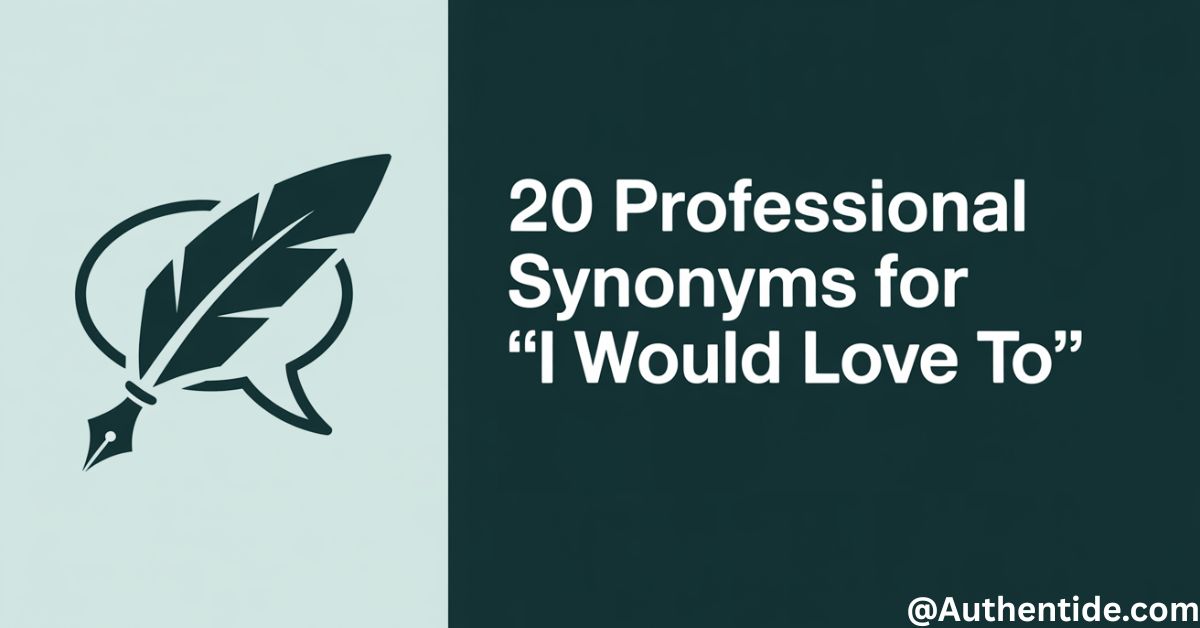Professional communication lies at the heart of career success in today’s interconnected business world. The phrases we choose can either open doors to opportunity or subtly undermine our professional image without us even realizing it. Among these everyday expressions, “I would love to” stands out as both common and potentially problematic depending on the context and delivery.
Most of us have found ourselves typing “I would love to” in emails, saying it during meetings, or including it in formal responses without giving it a second thought. But here’s the thing language carries subtle power in workplace settings, and being intentional about our word choices can dramatically enhance how colleagues, clients, and superiors perceive our competence and professionalism. The right alternative can convey enthusiasm while maintaining the appropriate level of formality and tone for the situation.
What makes this topic particularly fascinating is how different industries and organizational cultures interpret the same phrases. A startup might embrace casual enthusiasm, while a traditional law firm might expect more measured language. Learning to navigate these nuances doesn’t just make you sound better it demonstrates cultural intelligence and communication savvy that can set you apart in your professional setting. This article offers twenty refined alternatives that will help you express enthusiasm appropriately across various business contexts.
What to Say Instead of “I Would Love To”
- I am keen to
- I am eager to
- I would be delighted to
- I am interested in
- It would be my pleasure to
- I am excited to
- I look forward to
- I am enthusiastic about
- Count me in for
- I’d be happy to
- I welcome the opportunity to
- I am prepared to
- I appreciate the chance to
- I am ready to
- I am committed to
- I consider it a privilege to
- I value the opportunity to
- I am inclined to
- I am motivated to
- I am favorable to
Is It Professional to Say “I Would Love To”?
Before diving into alternatives, let’s address the elephant in the room: Is “I would love to” actually unprofessional? The answer isn’t black and white. In many formal contexts, particularly traditional corporate environments, the phrase can come across as overly casual or emotionally charged. The word “love” itself carries personal connotations that might not align with the tone and formality expected in certain business interactions.
However, context matters enormously. In creative industries, startups, or when building rapport with long-term clients, expressing genuine enthusiasm through phrases like “I would love to” can humanize your communication and strengthen relationships. The key lies in reading your audience and the situation correctly. When in doubt, opt for alternatives that maintain a positive attitude while scaling back emotional language.
What’s undeniable is that having a repertoire of professional alternatives gives you flexibility and demonstrates linguistic awareness. Let’s explore twenty appropriate phrases that can replace “I would love to” while still expressing enthusiasm in professional settings.
20 Professional Alternatives to “I Would Love To”
Here are 20 Professional Alternatives to “I Would Love To” (With Example)
1. I am keen to

The phrase “I am keen to” strikes an excellent balance between enthusiasm and professionalism. It communicates genuine interest without the emotional intensity of “love.”
Example in a networking context: “After learning about your company’s innovative approach to sustainability, I am keen to discuss potential collaboration opportunities that could benefit both our organizations. Would you have time for a brief call next week?”
2. I am eager to
Using “I am eager to” conveys readiness and enthusiasm in a professional setting without sounding overly emotional. It suggests both willingness and a proactive mindset.
Example in a project context: “Thank you for considering me for the product development team, Ms. Reynolds. I am eager to contribute my experience in user research to help meet our quarterly objectives.”
3. I would be delighted to
This phrase adds a touch of formality while still expressing enthusiasm. It works well in client communications or when responding to requests from senior leadership.
Example in client communication: “In response to your inquiry about our premium services, I would be delighted to schedule a demonstration that showcases features specifically relevant to your industry challenges. Would Tuesday at 2 PM work for your team?”
4. I am interested in
For situations requiring a more measured tone, “I am interested in” communicates positive engagement without overstating emotional investment perfect for formal contexts.
Example in a job application: “After reviewing the position requirements, I am interested in pursuing this opportunity further. My background in data analytics aligns well with your team’s current initiatives.”
5. It would be my pleasure to
This classic phrase conveys both enthusiasm and professionalism, with an element of service-mindedness that works well in customer-facing roles and business contexts.
Example in customer service: “It would be my pleasure to assist with resolving this billing discrepancy. I’ve already initiated a review of your account and will have an answer for you by tomorrow afternoon.”
6. I am excited to

While showing clear enthusiasm, “I am excited to” remains professionally acceptable in most modern workplaces, especially when discussing new projects or opportunities.
Example in team communication: “Following yesterday’s strategy meeting, I am excited to lead the market research phase of the project. I’ve already identified several key demographics we should explore.”
7. I look forward to
This phrase offers a perfect blend of positive anticipation and professional restraint, making it suitable for nearly any business communication.
Example in follow-up email: “Thank you for your time during yesterday’s interview. I look forward to hearing about next steps in the selection process and potentially joining your innovative team.”
8. I am enthusiastic about
When you want to express stronger interest while maintaining professional language, “I am enthusiastic about” strikes the right balance for workplace language.
Example in a mentoring request: “As someone who has followed your career trajectory, I am enthusiastic about the possibility of learning from your experience. Would you consider a monthly mentoring arrangement?”
9. Count me in for
This slightly more casual option works well in internal communications and collaborative environments where a friendly yet professional tone is appreciated.
Example in internal planning: “Count me in for the voluntary training session on the new CRM system. I believe these skills will help our department improve client response times.”
10. I’d be happy to
A versatile, warm professional phrase that works across many contexts while maintaining appropriate boundaries.
Example in colleague support: “I’d be happy to review your presentation before the client meeting. I can provide feedback on both the technical content and delivery approach if that would be helpful.”
11. I welcome the opportunity to
This phrase conveys openness and appreciation for new possibilities in a professional manner, perfect for networking and career advancement contexts.
Example in a cross-departmental collaboration: “I welcome the opportunity to contribute to the international expansion project. My experience with European markets could provide valuable insights for our entry strategy.”
12. I am prepared to

For situations where you want to emphasize readiness and capability rather than just enthusiasm, this phrase works exceptionally well.
Example in a management context: “After evaluating the team’s current challenges, I am prepared to implement the new workflow system as early as next Monday if you approve the timeline.”
13. I appreciate the chance to
Expressing gratitude while showing interest makes this a particularly polite and professional alternative that demonstrates both enthusiasm and humility.
Example in a learning opportunity: “I appreciate the chance to represent our department at the industry conference. I’ll be sure to share key findings with the team upon my return.”
14. I am ready to
Direct and action-oriented, this phrase communicates immediate preparedness without unnecessary embellishment ideal for effective messaging in time-sensitive situations.
Example in project management: “The research phase is complete, and I am ready to present our findings to stakeholders whenever the leadership team is available.”
15. I am committed to
When you want to express not just interest but dedication to seeing something through, this phrase demonstrates professionalism and reliability.
Example in a leadership role: “As we navigate these market challenges, I am committed to maintaining transparent communication with all team members about our strategic pivots.”
16. I consider it a privilege to
For particularly prestigious opportunities or when expressing genuine appreciation, this phrase conveys respect while maintaining professional communication.
Example in a speaking engagement: “I consider it a privilege to address the annual industry conference on emerging cybersecurity threats. My presentation will focus on practical solutions for mid-sized businesses.”
17. I value the opportunity to

Similar to appreciating a chance, this phrase emphasizes the worth you place on an engagement while keeping your language professionally measured.
Example in client relations: “I value the opportunity to continue serving as your financial consultant. Based on recent market changes, I’ve prepared several portfolio adjustments for your consideration.”
18. I am inclined to
When expressing tentative interest that depends on further details, this phrase offers professional caution while still indicating positive consideration.
Example in negotiation: “After reviewing your initial proposal, I am inclined to move forward with the partnership, provided we can agree on the timeline for the first phase of implementation.”
19. I am motivated to
This alternative emphasizes your internal drive rather than emotional reaction, making it excellent for professional goal-setting and career discussions.
Example in professional development: “Following yesterday’s workshop on emerging technologies, I am motivated to incorporate AI solutions into our current workflow to improve efficiency.”
20. I am favorable to

For formal situations where measured language is crucial, this phrase indicates positive reception without overstating enthusiasm.
Example in formal response: “After careful consideration of all proposals, I am favorable to pursuing Option B, as it offers the optimal balance of resource efficiency and market potential.”
Pro Tips for Choosing the Right Alternative
Selecting the perfect alternative to “I would love to” requires more nuance than simply picking from a list. Here are some professional insights to guide your choice:
Match your language to your recipient’s communication style. If your boss uses formal language, mirror that formality. If a client communicates casually, you can typically afford to be slightly more relaxed in your enthusiasm. This communication mirroring builds rapport and shows attentiveness.
Consider relationship history when choosing your phrasing. With new contacts, err on the side of formality (“I would be delighted to”). With established relationships, you can use slightly more personable options (“I’m excited to”). The evolution of language often follows the development of professional relationships.
Industry norms matter enormously in determining appropriate phrasing. Legal and financial sectors typically maintain more formal corporate writing, while marketing and creative fields embrace more expressive language. Understanding your industry-specific communication culture prevents awkward tonal mismatches.
Be aware of power dynamics. When communicating upward (to superiors or important clients), choose more formal alternatives. When communicating laterally or downward, slightly more casual enthusiasm may be appropriate and can foster team cohesion.
Situational Email Examples
Responding to a Job Offer
Too casual: “I would love to accept the marketing director position! I’m super excited to start!”
Professional alternative:
Subject: Accepting Marketing Director Position - Alex Johnson
Dear Ms. Thompson,
Thank you for offering me the Marketing Director position at Innovate Solutions.
**I am delighted to** accept this opportunity and confirm my start date of August 15th as discussed. The company's vision for expanding into international markets aligns perfectly with my background, and **I look forward to** contributing to these initiatives.
**I welcome the opportunity to** complete any pre-employment requirements before my start date. Please let me know what documentation you need from me to facilitate a smooth onboarding process.
Best regards,
Alex Johnson
Requesting a Meeting with a Potential Client
Too casual: “I would love to meet and talk about how we can help your business grow!”
Professional alternative:
Subject: Proposal Discussion Request - Enterprise Solutions for Rivera Consultants
Dear Mr. Rivera,
Following our brief conversation at the Industry Leadership Conference last week, **I am keen to** discuss how our enterprise solutions could address the efficiency challenges you mentioned your team is facing.
**I would be happy to** present a customized overview of our platform, specifically highlighting the features that would integrate with your existing systems. **I am available to** meet either virtually or at your office during the week of May 15th.
Would Tuesday at 2:00 PM work with your schedule? If not, please suggest a more convenient time.
Regards,
Morgan Wilson
Business Solutions Specialist
Technica Innovations
Responding to a Professional Development Opportunity
Too casual: “I would love to attend the leadership workshop! Sign me up!”
Professional alternative:
Subject: Leadership Workshop Participation Confirmation
Hello Dr. Martinez,
Thank you for sharing the opportunity to participate in the Advanced Leadership Skills workshop next month.
**I am enthusiastic about** developing my management capabilities, and this program's focus on cross-functional team leadership perfectly complements my current career objectives. **I appreciate the chance to** be included among the departmental representatives.
**I am prepared to** complete the pre-workshop assessment by the end of this week and have already blocked the workshop dates on my calendar to ensure full participation.
Thank you for considering me for this valuable professional development opportunity.
Best regards,
Jordan Lee
Project Coordinator
Frequently Asked Question
What else can I say instead of “I would like to”?
- I aim to
- I plan to
- I intend to
- I hope to
- I desire to
- My goal is to
- I wish to
- I aspire to
- I’m seeking to
- I’m looking to
- It’s my intention to
- My objective is to
- I’m determined to
- I’ve set out to
- I strive to
- My purpose is to
- I’m working toward
- I’m committed to
- I endeavor to
- I’m inclined to
How do you professionally say “I would love the opportunity”?
- I would greatly appreciate the opportunity
- I would welcome the chance
- I would be honored to have the opportunity
- I would value the possibility
- I am eager for the opportunity
- I would be grateful for the consideration
- I am enthusiastic about the prospect
- I would be delighted by the opportunity
- I would embrace the opportunity
- I am keen to pursue this opportunity
- I would consider it a privilege
- I am particularly interested in this opportunity
- I would find it rewarding to have the chance
- I am motivated by this potential opportunity
- I would sincerely appreciate being considered
How do I say I would love to help professionally?
- I’d be happy to assist with this matter
- I’m pleased to offer my support on this
- I welcome the opportunity to contribute
- I’m available to provide assistance
- I’d be glad to lend my expertise
- I’m ready to help resolve this situation
- I’m prepared to support this initiative
- I’m willing to contribute my skills to this effort
- I’m able to assist with this project
- I would be delighted to provide my assistance
- I’m at your service for this matter
- I’m eager to contribute to this solution
- I stand ready to help as needed
- I would be pleased to support you with this
- I’m committed to helping resolve this issue
Final Thoughts
The language we choose shapes how others perceive our professionalism, competence, and interpersonal skills. While “I would love to” isn’t inherently wrong, having an arsenal of refined alternatives gives you the flexibility to navigate various professional settings with linguistic precision. These twenty alternatives offer options across the spectrum of formality and tone, allowing you to calibrate your enthusiasm appropriately.
Remember that effective communication isn’t just about avoiding certain phrases it is about selecting the right words for the specific context, audience, and relationship. By expanding your professional vocabulary and developing sensitivity to these nuances, you demonstrate the kind of communication savvy that distinguishes truly exceptional professionals.

Your go-to place for smart synonyms and celebrity updates. Muhammad Hassan Abid is dedicated to creating useful, engaging content that informs, inspires, and truly serves your curiosity

